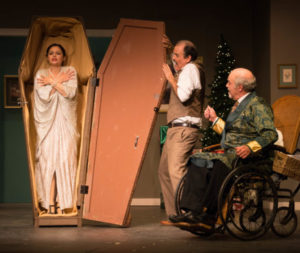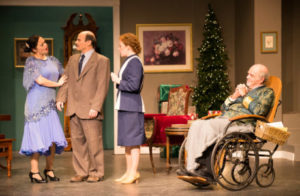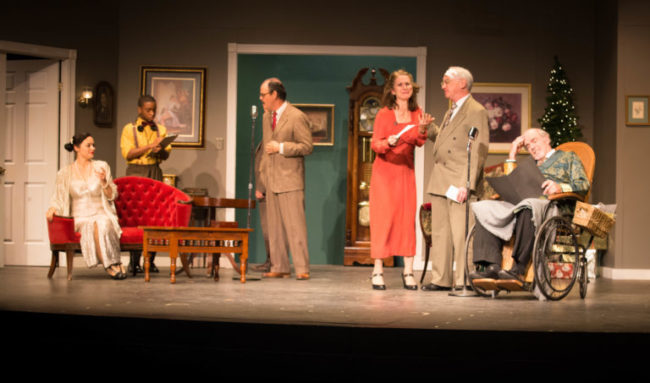Tis the season for businesses to capitalize on the holiday season, and the business of show is no exception. Local theatre listings for December are replete with Dickensian tales, miracles on some street or another, and Red Ryder BB guns. And then there are the companies that stage a piece that is a “holiday show” only insofar as it takes place on or around Christmas, thereby giving them an excuse to deck the set with boughs of holly and play carols in the lobby. Enter The Man Who Came to Dinner.

The current production of this “classic” piece of theatre now playing at Prince George’s Little Theatre is problematic at best, which is not entirely the fault of the production itself. When you start with a script that is very clearly written by two people, the entire plot (as it were) of which revolves around outdated tropes and stereotypes, one really can’t hold terribly high hopes for a successful outcome. As is the case with many of these older comedies (you know it’s a comedy because they tell you with a subtitle!), the humor relies on too many mostly unnecessary characters with too many mostly unnecessary subplots. Even if you can set aside the misogyny that the entire story is based on and consider it in the spirit of its time, a script like this requires that the pacing and timing be immaculate, otherwise it’s just awkward. PGLT’s The Man Who Came to Dinner is serving up a main dish of awkward with assorted sides of funny.
Like the show’s set— a unit that, in the dim pre-show lighting, appears to be well done as a tastefully-appointed, upscale home decorated for Christmas, but reveals bulging seams and crooked molding upon lights up – this production’s successes are best seen if you don’t look too closely. The properties, credited to Malia Murray, start off well enough with a period-appropriate Time Magazine and cigarette package among other accoutrements, but veer wildly off course with items like a modern spiral notebook and a clipboard with the sales sticker left on. Costumes by Linda Swann are marginally period-appropriate, but not at all what I’ve come to expect when I see Swann’s name under Costume Design. Most of the costumes appeared either too small or too large, and errant hems and massive snags detracted from believing the supposed status of the characters. And, for the life of me, I can’t figure out why theatres can’t seem to invest $20 in a hand-held clothing steamer. Lighting Design (Garrett Hyde) and Sound Design (Malia Murray) were minimal and neither enhanced nor diminished the quality of the production.
According to the program, Director Keith Brown wore many hats on the production team, as is often the case in small theatre. Perhaps his being distracted by too many jobs would explain the many questionable casting choices and general confusion that often happened on stage, particularly in any farcical scene or scene with more than two actors.

It’s difficult to summarize the story without giving up too many spoilers, since the script is built on never-ending (mostly unnecessary) plot twists, but I can say that the script starts out with a flurry of activity meant to indicate that the household of Mr. and Mrs. Ernest W. Stanley has been sent into disarray because famous radio personality Sheridan Whiteside has sustained a hip injury and must stay with them (read: take over the main floor of their home) for several weeks and, “Christmas is canceled!” As Mrs. Stanley, Rosalie Daelemans does an admirable job of trying to inject energy into this tizzy of an opening. Unfortunately, her efforts are for naught due to poor staging and pacing and, instead, the show limps out of the gate.
As an actor myself, I have to say that I feel for a cast that has to manage with such an uneven script as Moss Hart and George S. Kaufman have penned. Many of the smaller roles seem to have had their lines treated as afterthoughts. I will say that, for the most part, the actors do seem to be trying and there are some stand-outs in this production. Jon Marget is funny and adorably dotty as Dr. Bradley; Danny Brooks and the aforementioned Rosales Daelemans make the most of their parts as the exasperated Mr. and Mrs. Ernest W. Stanley; and Millie Ferrara is charming and highly amusing as the enigmatic Harriet Stanley.
Brook Berry pulls double duty as Professor Metz and Beverly Carlton. Though his characters are largely plot devices, he makes the most of every second he is on stage and provides two distinctly different, but equally entertaining, characters. Kudos to Berry, as well, for finding an in-character way to reapply Professor Metz’s absolutely ridiculous mustache, which threatened to fall completely off mid-scene.

Mike Dunlop is the real one-to-watch in this production and, thankfully, this talented gent does most of the heavy lifting for the show as Sheridan Whiteside, the razor-tongued radio man himself. Dunlop can easily be forgiven for flubbing a line here and there, given the sheer volume of lines he has, and I was grateful to see him handle any missteps without ever dropping character. Dunlop spends the show confined to an antique wheelchair that I can’t imagine could possibly be easy to maneuver, yet he still manages to completely use his body to take the stage and tell the story – no small feat, indeed. His portrayal of Sheridan Whiteside is spot on and he takes the absolute best writing of the show and elevates it further with his superb delivery. My companion and I agree that we would like to see more plays featuring Sheridan Whiteside and I would certainly lobby for Mike Dunlop to take the part and run.
Final thoughts: While much of the cast seems to be putting the effort in and there are a few very good performances, overall, The Man Who Came to Dinner is not one of my favorite scripts and PGLT’s production didn’t do much to change my mind about that.
Running Time: 2 hours and 30 minutes with one intermission
The Man Who Came To Dinner plays through December 16, 2017 at Prince George’s Little Theatre in residence at The Bowie Playhouse— 16500 White Marsh Park Drive in Bowie, MD. For tickets call the box office at (301) 937-7458 or purchase them online.
